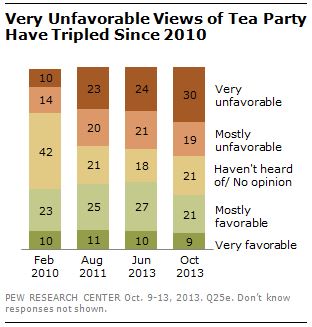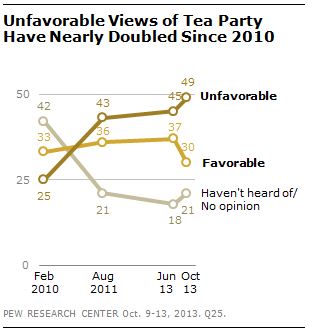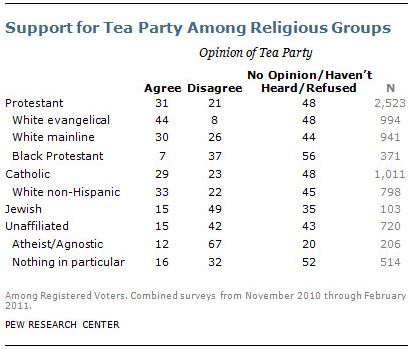 The recent Washington, DC drama has brought the Tea Party a lot of attention-and not in a good way. It maybe wise for secularists to pay closer attention to this matter than they currently do. And this is why.
The recent Washington, DC drama has brought the Tea Party a lot of attention-and not in a good way. It maybe wise for secularists to pay closer attention to this matter than they currently do. And this is why.
First, a little bit of history.
The Tea Party surfaced in 2009, as a reaction to election of President Obama. Few people knew (or know about) their past as a front for the tobacco industry. From day one, the Tea Party was politically divisive. The percentage of Democrats that agrees with it was in the single digits, as was the percentage of Republicans that disagreed. Most of the people surveyed, though, did not have an opinion about it. Those days are over.

Of note, despite everything that has happened since the Tea Party’s debut, their overall support has not shifted beyond 10%. What is truly impressive though, is the steep decline in the number of those who don’t have an opinion about it-matched, of course, by the number of those who have a negative view of it. In other words, almost everyone who has formed a new opinion about the Tea Party since 2010 (and that would be one out of five members of the public), have made a negative one. Congratulations! That is quite an achievement.
So who makes up the Tea Party? Politically, of course, that would be Republicans and Republican-leaners.

Broken down by demographic indicators, though, the picture is more interesting.

So, evangelical protestants, who are 17% of the US population, make up more than twice that percentage of Tea Party Republicans. The religiously unaffiliated, on the other hand, have a representation among the teabaggers that is half our national percentage. Which is not surprising, if you look at how closely Tea Party views are aligned with the Religious Right.

If I didn’t know any better, I would find this puzzling. Why should a movement that is supposedly all about “fiscal responsibility” be overwhelmingly homophobic? What do the two have in common? But of course we know the answer. It is a marriage of convenience: the religious right, who consider themselves a besieged minority, become Tea Party supporters because they see the latter group as the ones standing up against the big, bad world outside their bubble. And hence, it is not hard to guess who was most against the Tea Party all the way back in 2010, before it was cool.

Given our status as the most reviled minority in the US, we need to be mindful of trends like this. We have actually lead the public opinion as far as views on certain issues, such as the Tea Party and equality for gay people. And the public should know that.
